SWEDISH SOUTH ASIAN STUDIES NETWORK
SASNET in Stockholm March 2005: |
|
|
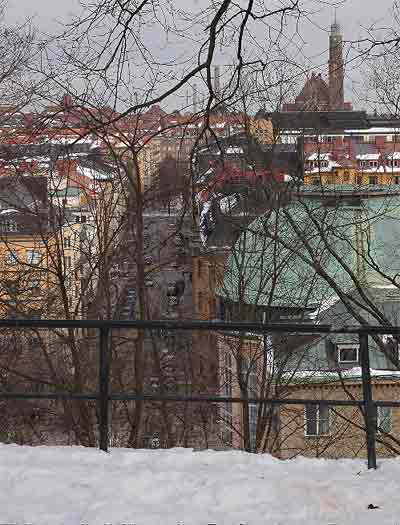 Stockholm
conference on Militant Islamism in Afghanistan
Stockholm
conference on Militant Islamism in Afghanistan
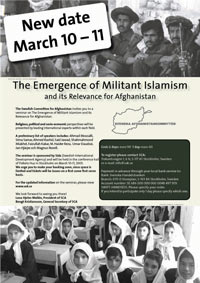 •
SASNET’s Lars Eklund participated in the International Seminar on
the ”Emergence of Militant Islamism and its Relevance for Afghanistan”,
arranged in Stockholm by the Swedish Committee for Afghanistan (SCA) 10–11
March 2005.
•
SASNET’s Lars Eklund participated in the International Seminar on
the ”Emergence of Militant Islamism and its Relevance for Afghanistan”,
arranged in Stockholm by the Swedish Committee for Afghanistan (SCA) 10–11
March 2005.
The two-day conference was attended by more than 200 people, and the key
speakers included internationally renowned experts such as Ahmad Moussalli,
Professor in Political Studies (specialised in Islamic political history)
at the American University, Beirut, Lebanon; and the Pakistani journalist
Ahmed Rashid.
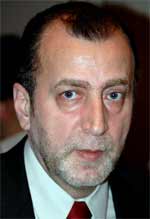
Ahmad Moussali held two lectures at the seminar, the first one on ”Radical Islamist concepts and views on World order and International relations”, and the second on ”Islam, Democracy and Pluralism”. Moussali, who has published a number of books on these issues, the most well-known being “The Islamic Quest for Democracy Pluralism, and Human Rights: From Classical and Medieval Roots to Modern Discourses”, gave learned discourses on the fundamental concepts on sharia and described the islamist movements over time and around the World, movements ranging from tolerance to extreme radicalism.
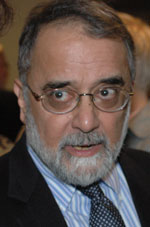 Ahmed
Rashid (photo to the left), the journalist and writer
based in Lahore writing for a wide array of Pakistani and International
newsapapers and magazines, and the author of the books 'Taliban: Islam,
Oil and the new Great Game in Central Asia' and 'Jihad, The Rise
of Militant Islam in Central Asia', has been invited to lecture at
the conference on ”The History and Role of Militant Islamism in
Pakistan and Central Asia”. In his lecture he gave a quite positive
image of the political development in Afghanistan, and stressed that this
might be a model also for the countries of Central Asia.
Ahmed
Rashid (photo to the left), the journalist and writer
based in Lahore writing for a wide array of Pakistani and International
newsapapers and magazines, and the author of the books 'Taliban: Islam,
Oil and the new Great Game in Central Asia' and 'Jihad, The Rise
of Militant Islam in Central Asia', has been invited to lecture at
the conference on ”The History and Role of Militant Islamism in
Pakistan and Central Asia”. In his lecture he gave a quite positive
image of the political development in Afghanistan, and stressed that this
might be a model also for the countries of Central Asia.
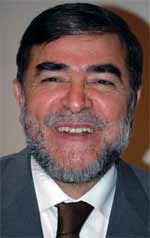 Two
cabinet ministers from the new Afghanistan government were also invited
as key speakers, the Deputy Minister of Foreign Affairs, Haider Reza;
and the Deputy Minister of Interior, Shahmahmood Miakhel.
Two
cabinet ministers from the new Afghanistan government were also invited
as key speakers, the Deputy Minister of Foreign Affairs, Haider Reza;
and the Deputy Minister of Interior, Shahmahmood Miakhel.
Haider Reza (photo to the right),
M.D. in surgery at the Kabul University Medical College in 1982, joined
the Mujahidin in the Panjshir valley and worked as a doctor during the
war against the Soviet Union. He also worked for the Swedish Committee
for Afghanistan in Peshawar, Pakistan for more than 10 years as a Medical
Coordinator and as Regional Director in Takhar province, northern Afghanistan.
In 1995 he became President and Secretary General of the Afghan Red Crescent
Society. From 2002 he holds the post of Deputy Minister of Foreign Affairs.
At the conference he lectured on ”Militancy of Islamism –
what do pious, ordinary Afghans think? Resistance or attraction?”.
He claimed strongly that the Taliban interpretation of Islam has nothing
to do with the way Islam traditionally has been practiced over the centuries
in Afghanistan.
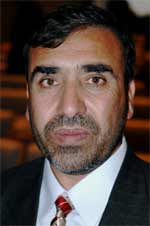 Shahmahmood
Miakhel (photo to the left) is a B.Sc in Agriculture from
Kabul University in 1979, and has later worked as an analyst within the
media sector, and as a consultant to the UN in connection with the establishment
of shuras in Afghanistan in the mid-1990’s and the emergency Loya
Jirga in 2002. As Deputy Minister of Interior he is responsible for the
reform of the administrative sections and local governments. He is also
in charge of the Afghanistan Stabilisation Programme.
Shahmahmood
Miakhel (photo to the left) is a B.Sc in Agriculture from
Kabul University in 1979, and has later worked as an analyst within the
media sector, and as a consultant to the UN in connection with the establishment
of shuras in Afghanistan in the mid-1990’s and the emergency Loya
Jirga in 2002. As Deputy Minister of Interior he is responsible for the
reform of the administrative sections and local governments. He is also
in charge of the Afghanistan Stabilisation Programme.
Miakhel lectured on ”Fundamentalism and Militancy in Afghanistan
– History and Situation today”, giving the historical background
that led to the Taliban regime. Just like Reza, Miakhel also strongly
claimed that the people of Afghanistan rejects extremism, and mentioned
the results of the presidential election in the Fall 2004 as a proof for
this.
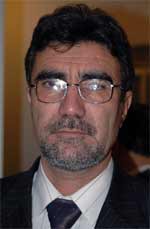 Another
prominent lecturer to speak at the conference was Ahmad
Zia Langari, Commissioner for Afghanistan Independent Human Rights
Commission. Langari has worked with the Ministry of Agriculture, Kabul
for fourteen years in the field of agricultural planning, and eleven years
with Afghan and international NGOs with agriculture and human rights issues.
Another
prominent lecturer to speak at the conference was Ahmad
Zia Langari, Commissioner for Afghanistan Independent Human Rights
Commission. Langari has worked with the Ministry of Agriculture, Kabul
for fourteen years in the field of agricultural planning, and eleven years
with Afghan and international NGOs with agriculture and human rights issues.
He has also participated in several international conferences on protection
and promotion of human rights and good governance. He lectured on the
”Sharia and the Gender issue experience from Afghanistan”,
in which he described the history of Islamism in South Asia and particularly
within Afghanistan from 1965 onwards. Langari focused on the extreme form
of Islam that came with the Taliban rule, and the hatred that their victory
bred. Langari was an eyewitness to the massacres that took place after
the conquer of Mazar-e-Sharif in 1996.
He also talked about the still deplorable situation for girls and women
in the country, but praised the present trend of more girls attending
schools and universities, and the new government’s policy of appointing
several women government ministers and a woman goernor for the Bamiyan
province.
Among the Swedish conference speakers focusing on Afghanistan were Carl Söderbergh, Director for the Swedish section of Amnesty International. Söderbergh, who has worked for the UN High Commissioner for Refugees, and during the 1990's was stationed in Pakistan, gave a passionate appeal against the war crimes that are carried out in Afghanistan by all sides, not the least by the US forces under the pretext of ”War on Terror”. Söderbergh has first hand experiences from Afghanistan as he has been working on legal protection issues concerning Afghan refugees, and has led a project funded by the Norwegian Refugee Council, where Afghans at risk (particularly women and minorities) were evacuated from the border area and hidden in 'safe houses'. During the bombing campaign of 2001, he interviewed refugees in order to document the bombing of civilian areas. He helped set up Amnesty's office in Kabul and has conducted a mission to northern Afghanistan in order to analyse the situation of returning refugees. Since then has continued to travel to Afghanistan in support of Amnesty's presence there. His lecture was titled ”Human Rights in the Shadow of the War on Terror”.
The last point of the conference was a panel debate on ”Afghanistan
and militant Islamism – what can be expected of the future?”
in which Langari, Reza and Miakhel paricipated along with Elisabeth Winter
from the British Agencies Afghanistan Group (BAAG) in the UK. Winter is
also active in setting up a European Network for NGO’s working on
Afghanistan, called ENNA.
More information
on the conference at SCA’s web page.
Huddinge Seminar on Traditional Bengali theatre, culture and music
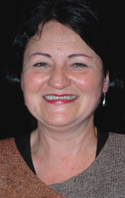
•
On Thursday 10 March 2005, Associate Professor Christina
Nygren at the Department of Musicology and
Theatre Studies, Stockholm University, organised a seminar on ”Traditional
Bengali theatre, culture and music” with the ten artists from
Purulia, West Bengal, India. The seminar was held at Tonsalen in the Slava
Theatre in Huddinge, south of Stockholm. Lectures and speeches were interspersed
with musical samples. Shonda Rani danced
along with Balaram Singh Sardar, playing
the madhol drum (photo to the right). The two Purulia
baul singers Lokhon Das Baul and
Rasa Raj also performed along with musicians
playing drums, flute and clarinet.
The group gave a performance called ”Bengali Night”
featuring suggestive so-called jhumu music and nachni
dance (by Shonda Rani), at Södra Teatern in Stockholm the day after,
on Friday 11 March 2005.
SASNET’s Lars Eklund was present at the seminar, where Christina
Nygren introduced the popular dance and music tradition of the backward
Purulia region of the state of West Bengal. Dr. Mirja
Juntunen from the Section for Indology,
Department of Oriental Languages, Stockholm University, then read
translations into Swedish of the songs performed by the Purulia artists,
and lectured about the mythological and spiritual content in the texts
and in the dance choreography. Ramayana and the myths about the love between
Radha and Krishna are the two main sources of motifs. Her lecture was
named ”Kärlekens fågel blandar sin sång med tårar”.
The
leader of the Purulia group, Sanjai Kumar Mahato
(photo to the left), then talked about how the traditional artists
live at home, on how they are considered to be untouchable and lawless
people but on the other hand are loved by their audiences. And finally
Erik Norlin from Teater Slava gave some reminiscences
from a visit to Purulia he had made recently.
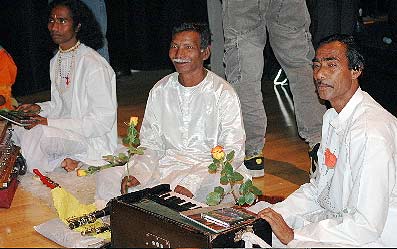 The
Purulia artists’ visit to Sweden (three of the musicians on
the photo to the right) was organised by Christian Nygren in collaboration
with Södra Teatern in Stockholm and Slava Theatre in Huddinge, and
was fiunded by the Swedish Institute.
The
Purulia artists’ visit to Sweden (three of the musicians on
the photo to the right) was organised by Christian Nygren in collaboration
with Södra Teatern in Stockholm and Slava Theatre in Huddinge, and
was fiunded by the Swedish Institute.
Christina Nygren has initiated several similar exchanges of theatre groups
and musicians from India and Bangladesh to Sweden in the past.
Besides this she is also working part-time as project leader for the Sida-sponsored
five-year project called ”Voices of the Children”,
aimed at strengthening children’s theatre in Asia. Christina Nygren
is in charge of this project that is funded by Sida and includes an exchange
of Swedish and Indian/Bangladeshi theatre groups during 2004 and 2005.
The first group to visit Sweden was the Rupantar group from Khulna, Bangladesh,
that performed in Stockholm in March 2004. In February 2005 the Swedish
puppet theatre group Tittut visited Bangladesh, where they organised a
workshop in Khulna. Another two theatre groups have visited India/Bangladesh
recently as paret of the Sida project, namely Teater Pero from Stockholm
and Slava Theatre from Huddinge.
Christina Nygren has been involved in research on popular forms of music
and dance in India and Bangladesh ever since the beginning of the 1990’s.
She is working on a research project titled ”Perspectives on Popular
Theatre – Bengal as religious, artistic and social context for popular
theatre and dance”. The project has focused on the popular forms
of theatre prevalent in Bengal, especially yatra, and will eventually
result in a book, to be published during 2005. More
information on Christina Nygren’s research.
Visiting South Asian ambassadors in Stockholm
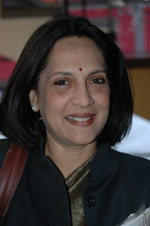 |
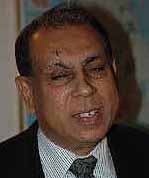 |
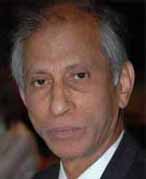 |
| Mrs. Deepa Gopalan Wadhwa, new Ambassador of India to Sweden | Mr N. Sikkander, new Ambassador of Sri Lanka to Sweden | Mr. Sabihuddin Ahmed, new Ambassador of Bangladesh to Sweden |
• 16–17 March 2005 SASNET’s Staffan Lindberg
and Lars Eklund travelled to Stockholm in order to network with the recently
appointed new ambassadors to Sweden from India (Mrs. Deepa Gopalan Wadhwa),
Sri Lanka (Mr N. Sikkander) and Bangladesh (Mr. Sabihuddin Ahmed), in
separate meetings. Both Ms. Wadhwa and Mr. Sikkander assumed duties as
ambassadors to Sweden during the month of February 2005, whereas Mr. Ahmed
arrived a few months earlier.
Discussions were held on the prospects of increasing academic exchange
in the fields of research and education between universities in Sweden
and their respective country, and the role SASNET might have in facilitating
these efforts.
India Evening/Book release party at Royal Institute of Technology (KTH)
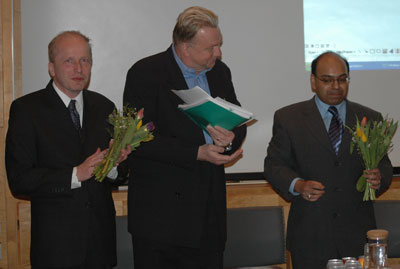 •
SASNET’s Staffan Lindberg and Lars Eklund participated in the release
party at KTH in Stockholm on Wednesday 16 March 2005, celebrating the
publishing of a new book on “Natural Arsenic in Groundwater:
Occurrence, Remediation and Management” recently published
by Taylor & Francis.
•
SASNET’s Staffan Lindberg and Lars Eklund participated in the release
party at KTH in Stockholm on Wednesday 16 March 2005, celebrating the
publishing of a new book on “Natural Arsenic in Groundwater:
Occurrence, Remediation and Management” recently published
by Taylor & Francis.
The book features chapters on the Arsenic contamination of groundwater
in Bangladesh and India, and is edited by Prosun
Bhattacharya, Associate Professor of Groundwater Chemistry at KTH’s
Department of Land and Water Resources Engineering,
in collaboration with Jochen Bundschuh, Universidad
Nacional de Santiago del Estero, Argentina, and D.
Chandrashekharam, Indian Institute of Technology, Mumbai, India.
On the photo to the right are seen two of the book editors, Bundschuh
and Bhattacharya getting flowers from the KTH President, Professor Anders
Flodström.
More information on the arsenic research at the
Dept. of Land and Water Resources Engineering.
The book release party was extended to be an ”India
Evening”, attended by among others the Indian ambassador Mrs. Deepa
Gopalan Wadhwa, and the Bangladeshi ambassador Mr. Sabihuddin Ahmed.
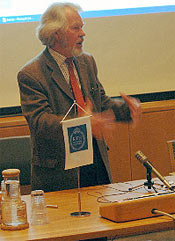
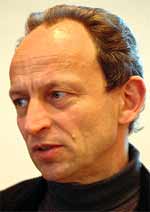 Mrs
Wadhwa held a speech on ”Challenges for safe drinking water
in India – Achievement of the Millennium Development Goals”.
She was followed by Professor Emeritus Gunnar Jacks who lectured on ”A
walk through the past – Our Experiences with Groundwater Resources
in India”, about the 30 years of Indo-Swedish interaction between
the Dept. of Land and Water Resources Engineering at KTH, and the Tamil
Nadu Agricultural University in Coimbatore.
Mrs
Wadhwa held a speech on ”Challenges for safe drinking water
in India – Achievement of the Millennium Development Goals”.
She was followed by Professor Emeritus Gunnar Jacks who lectured on ”A
walk through the past – Our Experiences with Groundwater Resources
in India”, about the 30 years of Indo-Swedish interaction between
the Dept. of Land and Water Resources Engineering at KTH, and the Tamil
Nadu Agricultural University in Coimbatore.
Prof. Staffan Lindberg (photo to the left) was kindly given the
opportunity to present SASNET’s activities for the audience, and
finally Prof. Ramon Wyss, Vice-President
of KTH in charge of International Affairs (photo to the right),
talked about ”Prospects of Indo-Swedish collaborations”,
focusing on ongoing efforts to increase research cooperation between KTH
and Indian institutions.
SASNET - Swedish South Asian Studies Network/Lund
University
Address: Scheelevägen 15 D, SE-223 70 Lund, Sweden
Phone: +46 46 222 73 40
Webmaster: Lars Eklund
Last updated
2006-05-30
